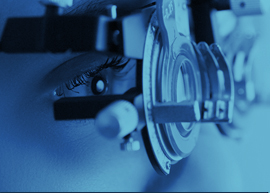Since the start of COVID-19, many children have learned remotely at one point or another. While parents are anxious that their children not fall behind academically, eye professionals are concerned that undiagnosed visual problems will have an impact on the child's performance during the coming school year.
A child's capacity to learn can be harmed if visual problems go unnoticed. That is why, before the new school year begins, eye doctors strongly advise that children have a comprehensive eye exam.
While it may be tempting to depend on school-provided eye screenings, these superficial visual acuity tests can only detect a small fraction of vision problems. Only a comprehensive eye exam performed by an eye doctor can effectively diagnose and treat a variety of vision and eye health problems.
How Is Vision Affected By Online Learning?
The amount of time children spend staring at computer devices was already a concern before the covid pandemic, but the epidemic has further heightened these concerns. Children spent twice as much time on screens during COVID-related closures than they did before the pandemic, according to The Indian Journal of Ophthalmology.
For one thing, staring at a digital screen for long periods of time strains the eyes, making children and adults more prone to digital eye strain, one of the most common symptoms of computer vision syndrome. People who stare at a screen for two hours or longer are at an increased risk of developing this condition.
Digital eye strain symptoms may include:
- Dry eyes
- Eye pain
- Eye fatigue
- Headaches
- Blurred vision
- Shoulder and neck pain
A combination of the following can trigger or contribute to symptoms:
- Poor posture
- Poor lighting
- Screen brightness
- Undetected vision problems
- Excessive time looking at a screen
- Glare and reflections from the screen
Aside from digital eye strain, multiple studies have revealed that children who spend a lot of time indoors performing ‘near work’ like writing, reading and staring at computers and other digital devices have a faster rate of myopia progression.
According to a study published in the American Academy of Ophthalmology's professional magazine, Ophthalmology, 1st graders who spent at least 11 hours per week outside in the sunshine had a slower progression of myopia. Around the world, researchers are investigating whether some component of sunshine, or the fact that children who play outdoors look into the distance, play a role.
Why Are Eye Exams Important?
Since visual learning accounts for up to 80% of a child's learning, even the tiniest vision problem can have a severe impact on their academic performance. By taking your child to their eye doctor once a year the optometrist can diagnose and treat refractive errors like myopia, hyperopia, and astigmatism, as well as check visual skills like convergence insufficiency, binocular vision, focusing, and more.
Comprehensive eye exams are the most effective way to detect both minor and major eye problems. Children with a family history of vision difficulties should get their eyes examined more frequently, or as directed by their eye doctor.
Regular eye exams are important for everyone in the family, but they're especially important for individuals who spend a lot of time in front of a screen.
Don’t put off your child’s annual eye exam. Schedule an appointment with Cove Eyecare in Copperas Cove today!
At Cove Eyecare, we put your family's needs first. Talk to us about how we can help you maintain healthy vision. Call us today: 254-549-1142 or book an appointment online to see one of our Copperas Cove eye doctors.
Want to Learn More? Read on!
FOLLOW US:
Q&A
Q: At what age should I have my child’s eyes examined?
- A: According to the American and Canadian Optometric associations, it’s recommended that a child undergo their first exam between 6-12 months of age. The second time is at age 3.Before a child starts school they should have their eyes examined, and every 1 to 2 years after that, based on their optometrist's recommendation.
Q: If my child passes their school vision screening, do they need their eyes examined?
- A: Yes! School vision screenings briefly examine the eyes to detect a handful of vision problems, such as myopia. They don't look for visual impairments or other issues that could hinder your child's academic progress.Your optometrist will evaluate your child's eye health and vision, along with visual abilities, including eye-tracking and depth perception, to let you know whether your child's eyes are ‘school-ready.’
Quality Frames For Prescription Eyeglasses & Computer Glasses In Copperas Cove, Texas. Visit Cove Eyecare for an eye exam and eyeglasses that match your style.





